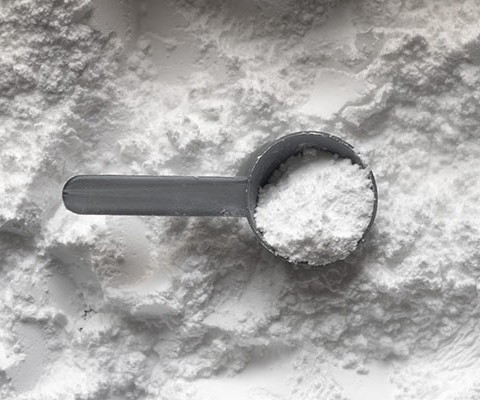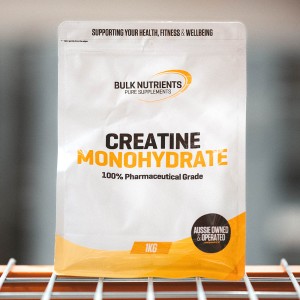Does Creatine Lead to Water Retention?

The power of creatine
Firstly, we take creatine because we know it works.
In fact, it's one of the most researched supplements out there.
Increasing muscle strength is an important goal when training and using supplements, and creatine, an organic compound, does a fine job at this.
Creatine allows muscles to produce more adenosine triphosphate (ATP), a high-powered energy-carrying molecule that gives you energy during exercise. So by taking creatine, you're getting the energy to lift more which may help with muscle gains.
Given an important factor in muscle growth is progressive overload (adding more weight to the bar) you're putting yourself into a position for success!
And when research examines the role of creatine on muscle growth directly, it comes up favourably; those who take creatine can double the amount of muscle growth compared to those who don't.
There's also strong research to say creatine won't just benefit your physical performance but enhance brain function and memory, too.
But naturally, when something is good, there are whispers that it may be bad in some way, too.
Creatine and water retention
Where did this come from?
Well, like most fitness myths, it's part bro science and part one study that didn't have the same conclusion as the majority of them.
And this one study was from 1985, which found that 20 grams of creatine a day for 6 days was associated with water retention.
Now for starters, it's recommended we take 3-5 grams of creatine per day. The initial 20 grams is just the loading phase of creatine.
So, the water retention from 20 grams is going to be vastly different to 3-5 grams.
And yes, water retention in the first three days is part of the deal; total body water, extracellular body water, and intracellular water are all increased.
For a quick snapshot of what these are:
Total body water: is the amount of water content found in your body. Up to 60% of the human body contains water.
Extracellular Water: is the water located outside your cells. For example, the water in your blood.
Intracellular Water: is the water located inside your cells.
Creatine is an osmotically active substance, meaning it mixes well with water. This means it mixes well into your muscle.

So, in this sense, that's how creatine can cause you to retain water, at least in the short term as we learned.
But what about the long term?
Well, this study gave subjects around 20 grams per day for 7 days, and then 4 weeks of about 5 grams per day, and they reported no significant changes in total body water, extracellular body water or intracellular water.
Looking pretty good for no serious long term water retention so far...
Another study where subjects took 0.03 grams per kilogram of body weight per day for six weeks saw no increases in total body water. This dosage was 2.4 grams for someone that weighed 80 kilos.
Another with a 0.3 grams per kilogram of lean mass for 5 days (around 20 grams for lots of people) and then 0.075 grams per kilogram of body weight per day (6 grams for someone who weighs 80 kilograms) for a whopping 42 days, saw no changes in total body water.
But in this study, total body water was increased via creatine.
Subjects had their water weight measured before and after 28 days of creatine supplementation; body mass and total body water increased but extracellular water and intracellular water did not.
But in this study, total body water, extracellular water and intracellular water were increased after 8 weeks; however, the ratio of muscle to intracellular water remained similar in the creatine group versus the placebo group. So the extra water came with the extra muscle.
What's not spoken about enough is that intracellular water is important for protein synthesis (thus muscle growth) and creates more muscle gains over time; so it's nothing to stress about so much.

So, what's the conclusion?
Here's one from scientist Jose Antonio, who pens one nicely:
"In summary, while there is some evidence to suggest that creatine supplementation increases water retention, primarily attributed to increases in intracellular volume, over the short term, there are several other studies suggesting it does not alter total body water (intra or extracellular) relative to muscle mass over longer periods of time. As a result, creatine supplementation may not lead to water retention."
So, there we go; keep taking creatine, and don't worry about water retention. The benefits outweigh the downsides strongly!
References:
- Andre TL, Gann JJ, McKinley-Barnard SK, Willoughby DS. Effects of five weeks of resistance training and relatively-dosed creatine monohydrate supplementation on body composition and muscle strength and whole-body creatine metabolism in resistance-trained males. Int J Kinesiol Sports Sci. 2016;4:28–35.
- Anna Casey, Paul L Greenhaff, Does dietary creatine supplementation play a role in skeletal muscle metabolism and performance?, The American Journal of Clinical Nutrition, Volume 72, Issue 2, August 2000, Pages 607S–617S, https://doi.org/10.1093/ajcn/72.2.607S
- Antonio, J., Candow, D.G., Forbes, S.C. et al. Common questions and misconceptions about creatine supplementation: what does the scientific evidence really show?. J Int Soc Sports Nutr 18, 13 (2021). https://doi.org/10.1186/s12970-021-00412-w
- Benton D, Donohoe R. The influence of creatine supplementation on the cognitive functioning of vegetarians and omnivores. Br J Nutr. 2011 Apr;105(7):1100-5. doi: 10.1017/S0007114510004733. Epub 2010 Dec 1. PMID: 21118604.
- Hultman, E.; Soderlund, K.; Timmons, J. A.; Cederblad, G.; Greenhaff, P. L. Muscle creatine loading in men. J. Appl. Physiol. (1985) 1996, 81, 232-237.
- Kreider, R.B., Kalman, D.S., Antonio, J. et al. International Society of Sports Nutrition position stand: safety and efficacy of creatine supplementation in exercise, sport, and medicine. J Int Soc Sports Nutr 14, 18 (2017). https://doi.org/10.1186/s12970-017-0173-z
- La Scala Teixeira CV, Evangelista AL, Pereira PEA, Da Silva-Grigoletto ME, Bocalini DS, Behm DG. Complexity: A Novel Load Progression Strategy in Strength Training. Front Physiol. 2019;10:839. Published 2019 Jul 3. doi:10.3389/fphys.2019.00839
- Powers ME, Arnold BL, Weltman AL, Perrin DH, Mistry D, Kahler DM, Kraemer W, Volek J. Creatine Supplementation Increases Total Body Water Without Altering Fluid Distribution. J. Athl Train. 2003;38:44–50.
- Rae C, Digney AL, McEwan SR, Bates TC. Oral creatine monohydrate supplementation improves brain performance: a double-blind, placebo-controlled, cross-over trial. Proc Biol Sci. 2003 Oct 22;270(1529):2147-50. doi: 10.1098/rspb.2003.2492. PMID: 14561278; PMCID: PMC1691485.
- Raghunathan AV, Aluru NR. Molecular understanding of osmosis in semipermeable membranes. Phys Rev Lett. 2006 Jul 14;97(2):024501. doi: 10.1103/PhysRevLett.97.024501. Epub 2006 Jul 10. PMID: 16907451.
- Rawson ES, Stec MJ, Frederickson SJ, Miles MP. Low-dose creatine supplementation enhances fatigue resistance in the absence of weight gain. Nutrition. 2011;27:451–5.
- Ribeiro AS, Avelar A, Kassiano W, Nunes JP, Schoenfeld BJ, Aguiar AF, Trindade MCC, Silva AM, Sardinha LB, Cyrino ES. Creatine Supplementation Does Not Influence the Ratio Between Intracellular Water and Skeletal Muscle Mass in Resistance-Trained Men. Int. J. Sport Nutr. Exerc. Metab. 2020:1–7.
- Rosene JM, Matthews TD, Mcbride KJ, Galla A, Haun M, Mcdonald K, Gagne N, Lea J, Kasen J, Farias C. The effects of creatine supplementation on thermoregulation and isokinetic muscular performance following acute (3-day) supplementation. J. Sports Med. Phys. Fitness.2015;55:1488–96.
- Safdar A, Yardley NJ, Snow R, Melov S, Tarnopolsky MA. Global and targeted gene expression and protein content in skeletal muscle of young men following short-term creatine monohydrate supplementation. Physiol. Genomics. 2008;32:219–28.
- Silva AM, Matias CN, Santos DA, Rocha PM, Minderico CS, Sardinha LB. Increases in intracellular water explain strength and power improvements over a season. Int J Sports Med. 2014 Dec;35(13):1101-5. doi: 10.1055/s-0034-1371839. Epub 2014 Jul 10. PMID: 25009970.
- Spillane M, Schoch R, Cooke M, Harvey T, Greenwood M, Kreider R, Willoughby DS. The effects of creatine ethyl ester supplementation combined with heavy resistance training on body composition, muscle performance, and serum and muscle creatine levels. J. Int. Soc. Sports Nutr. 2009;6:6–6.
- Ziegenfuss T, Lowery LM, Lemon P. Acute fluid volume changes in men during three days of creatine supplementation. Journal of Exercise Physiology Online. 1998;1.
Related Blogs

5 Foods/Drinks to Increase Your Metabolism
Posted by Bulk Nutrients
Estimated reading time: 6 minutes

Vegan Creatine Benefits
Posted by Bulk Nutrients
Estimated reading time: 5 minutes

Why Women Shouldn't Fear Creatine
Posted by Bulk Nutrients
Estimated reading time: 2 minutes















































